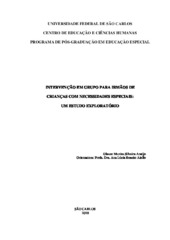Intervenção em grupo para irmãos de crianças com necessidades especiais: um estudo exploratório

Visualizar/
Data
2010-03-01Autor
Araújo, Glauce Munira Silveira
Metadata
Mostrar registro completoResumo
Group interventions may be a useful strategy for helping siblings of disabled children to cope with difficulties related to the special sibling. The purposes of the present study were: 1) to identify the main needs of older siblings of disabled children; 2) to prepare and implement one group intervention and 3) to identify changes in some aspects of the participants lives, such as interaction between the siblings, coping strategies and knowledge about the sibling s disability . Study participants were eight pre-adolescents and adolescents aged 10 to 15 years, divided into Group 1 (G1) and Group 2 (G2). Participants underwent three evaluations, at least one before the intervention and one after it. The instruments used were the Entrevista com Irmão de Indivíduo com Necessidades Especiais (Interview with Sibling of Disabled Individual), the Formulário de Irmãos (Sibling s Questionnaire) and the Inventário de Estresse e Enfrentamento (Stress and Coping Inventory), besides the Questionário de Satisfação com o Grupo de Apoio (Satisfaction of the Support Group Questionnaire), the last one were applied at the end of the intervention. The study also conducted interviews with the mothers of the participants. The intervention was conducted in nine sessions, once a week, lasting two hours each, first with the G1 and then with the G2. The data were analyzed descriptively and/or quantitatively, and the results were compared immediately before and immediately after the intervention. The comparison was done for each participant in order to obtain evidences of changes in aspects related with the session s themes. The results indicated that after the intervention there was an increase of knowledge about the siblings disability and related aspects; variation of the interaction levels between siblings and the kind of behaviors directed at them; variation in the stress levels and in the strategies used to deal with difficult situations related to his brother or sister, demonstrating the role of intervention that is modify some aspects of participants lives. This study draws attention to the importance of group interventions applied to this kind of population, appropriate to his age and his needs.